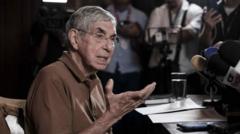Oscar Arias, the former president of Costa Rica and Nobel Peace Prize recipient, announced the revocation of his US visa, attributing the decision to his recent criticisms of Donald Trump. In a news conference held in San José, Arias, aged 84, indicated that the cancellation notice was delivered via a brief email from US authorities, lacking any detailed explanation.
Arias had made headlines after likening Trump's conduct to that of a Roman emperor, asserting that small nations struggle to voice opposition to the US government. He suggested that while it may be speculative, his re-establishment of diplomatic relations with China during his presidency from 2006 to 2010 could have played a role in his visa's cancellation. His administration's 2007 decision to sever ties with Taiwan in favor of Beijing is considered significant.
Despite expressing uncertainty over the reasons behind the revocation, Arias emphasized that he is committed to maintaining his stance against what he perceives as undue influence from the US, notably during his time in office when he claimed Costa Rica acted independently without US directives.
Interestingly, Arias isn't alone in this predicament as other Costa Rican political figures have similarly seen their visas revoked, particularly those opposed to the current administration's stance toward China and its growing influence in Latin America. The US government's approach towards Central American nations and their relations with China continues to evoke widespread discussion and concern.
Arias had made headlines after likening Trump's conduct to that of a Roman emperor, asserting that small nations struggle to voice opposition to the US government. He suggested that while it may be speculative, his re-establishment of diplomatic relations with China during his presidency from 2006 to 2010 could have played a role in his visa's cancellation. His administration's 2007 decision to sever ties with Taiwan in favor of Beijing is considered significant.
Despite expressing uncertainty over the reasons behind the revocation, Arias emphasized that he is committed to maintaining his stance against what he perceives as undue influence from the US, notably during his time in office when he claimed Costa Rica acted independently without US directives.
Interestingly, Arias isn't alone in this predicament as other Costa Rican political figures have similarly seen their visas revoked, particularly those opposed to the current administration's stance toward China and its growing influence in Latin America. The US government's approach towards Central American nations and their relations with China continues to evoke widespread discussion and concern.





















